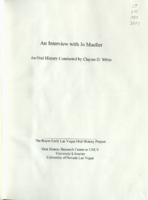Search the Special Collections and Archives Portal
Search Results

Mara Braun interview, September 9, 2019: transcript
Date
Archival Collection
Description
Interviewed by Barbara Tabach. Mara Braun, a native of Puerto Rico, has lived in Las Vegas since 1975. She is the owner/operator of a successful event and catering business. Mara married Abe Braun and raised their children in both Latinx and Jewish traditions.
Text

Transcript of interview with Jo Mueller by Claytee White, August 26, 2011
Date
Archival Collection
Description
Jo Ann and Hal Mueller arrived in Las Vegas in 1956 when he accepted a meteorologist position. In addition to raising their two children, Jo was active in PTA, worked for Weight Watchers, and was a volunteer with League of Women voters. She tells the story of meeting Hal and their whirlwind romance to the altar, moving to the Caroline Islands and eventually choosing Las Vegas over Seattle as their next career assignment. Las Vegas became their permanent home and Jo reflects on life and experiences here.
Text

Frieda Steinberg interview, September 10, 2014, November 10, 2014, August 15, 2017: transcript
Date
Archival Collection
Description
Interviewed by Barbara Tabach.
Text

Transcript of interview with Sara Denton by Claytee White, July 13, 2015
Date
Archival Collection
Description
Sara Denton loves life, laughter, and wonderful adventures. She is the mother of four children, a Distinguished Nevadan, lover of books and art, political campaign organizer, community activist, and friend. Sara is one of the founders of Boulder City’s most successful philanthropic fundraisers, Art in the Park. Denton was born in Paducah, Kentucky, into a family of readers and thinkers. Therefore, when the opportunity arose, at 18 years of age, to move the Washington, DC to work in the Signal Corps, she seized the opportunity. From the vantage point of her apartment, she could see the Secret Service assisting Franklin D. Roosevelt into his limousine at the back door of the White House. His polio was hidden from the public but this diversion allowed Sara and her friends to greet and be greeted by their hero. While in DC, Sara worked for General Hayes and one day struck up a conversation with a young soldier, Ralph Denton. Soon they married and moved to his home state, Nevada. After several years in Elko, NV, the Dentons moved to Las Vegas where Sara worked in the campaigns of Grant Sawyer, Howard Cannon, and Alan Bible. Moving the family to Boulder City though, was the wisest relocation by the family because the children grew up in a caring community with good schools. And the city provided the opportunity for Sara’s creativity to flow in many directions including travel, entrepreneurship, philanthropy, and community building efforts. This interview is filled with laughter. I enjoyed the conversation.
Text

Transcript of interview with George Levine by Barbara Tabach, April 16, 2015
Date
Archival Collection
Description
In this interview, George reflects upon his life in Las Vegas, particularly the period as ma?tre d? of the Sand?s Copa Room. Joined by his daughter - and former United States Democratic Congresswomen-Shelley Berkley, George shares stories of working in the gaming industry during this unique era, including those of Frank Sinatra and Wayne Newton. He also talks about his life as a professional gambler.
Born on February 28, 1925 in Sommerville, New Jersey, George Levine?s family moved to his childhood home, Manhattan?s Lower East Side, when he was six months old. George served on a United States Navy aircraft carrier for thirty months during World War II. After returning home, he met his first wife Estelle, with whom he had two daughters, and soon moved to Kiamesha Lake, New York to work at the Concord Resort Hotel. In 1963, George and his family moved to Las Vegas and took his first job at Mr. Sy?s Casino. Six months later he began waiting tables at the Sands Hotel and Casino. He worked his way up the ranks and was ma?tre d' from 1979 until the hotel closed in 1996.
Text

Transcript of interview with Gertrude Rudiak by Claytee White, January 11, 2007
Date
Archival Collection
Description
Gertrude (n?e Rightman) Rudiak was born in 1915 in North Dakota to Russian immigrants. She grew up in Wisconsin until 1924. That was the year the family drove to California via the Yellowstone Trail, a dusty, undeveloped road marked by yellow stones. In Los Angeles, her father practiced chiropractic, a holistic approach to well-being for which there was little knowledge at the time. Gertrude earned her music degree at University of California at Berkeley; a decision that did not lead to a career. She then attended a business college and got a job as a social worker in Northern California. In 1941, she met and soon married George Rudiak. It was the advent of World War II. George enlisted in the service and was assigned to Las Vegas Gunnery School (Nellis Air Force Base.) Since he had a law degree from University of California at Berkeley and passed the Nevada Bar exam, he found supplemental employment with local attorneys. Las Vegas became the Rudiaks? permanent home where they raised their five children. In this interview Gertrude recalls the stories of coming to live in Las Vegas of the 1940?s: their phone number was 1-2-3; the neighborhood they lived in longest being Scotch 80s and being part of the secular and Jewish communities.
Text

Transcript of interview with Norma Friedman by Barbara Tabach, November 19, 2015 and April 06, 2016
Date
Archival Collection
Description
It was a scorching Fourth of July, when Norma (n?e Adler) and Leon Friedman rolled into their new home of Las Vegas in 1973. Nevertheless, they were content with leaving Gary, Indiana behind, and starting fresh with the family?s new ownership of Walker Furniture. Norma recalls her first stop in checking out Las Vegas was to visit the synagogue ? Temple Beth Sholom being the only option. Her oldest son would soon become a bar mitzvah. Feeling good about that, she and her sister-in-law who was also relocating to Las Vegas for the furniture business, searched for new homes. Norma settled into the community through volunteer work as well as through employment outside the family business. She worked in the real estate briefly and in a jewelry store at the Dunes. A natural organizer, she immersed herself in religious and civic organizations including the Jewish Federation, Jewish Family Service Agency, and volunteering at Selma Bartlett Elementary School in Henderson. Norma shares stories of her Jewish heritage and upbringing in Pittsburgh, the decision to move to Las Vegas, making fast friendships during her life in Las Vegas and the joy she has in traveling the world with Leon, who passed in 2004. In 2017, Norma was honored by the Jewish Family Service Agency.
Text

Transcript of interview with Freddie Glusman by Barbara Tabach, October 29, 2015
Date
Archival Collection
Description
In this interview Glusman discusses his early memories of being raised in Vancouver, Canada and how he ended up in Las Vegas. He reflects on how he first got his start in the town and his early dealings with casinos and their owners while he was working as a carpet and drapery salesman and while working for Fabulous Magazine. Glusman explains how he started his restaurant and tells about the people he encountered while doing this that where significant to both the Jewish community and Las Vegas as a whole. He recounts stories that include such people as Meyer Lansky, Al Sachs, and Moe Dalitz.
Text

Transcript of interview with David Straus and Heidi Straus by Barbara Tabach, November 6, 2015
Date
Archival Collection
Description
In this interview, the Straus? discuss the joys of growing up in Las Vegas during the 1960s and 1970s, and the changes within the community over time, especially in educational opportunities. Both talk about Joyce Straus? career as artist and art educator, and the influence she had on their lives. They also remember Heidi?s father, Jay Sarno, and the impact he had on the local gaming industry. There is also discussion of the founding of Congregation Ner Tamid, the role of Jewish women?s philanthropy within the community, as well as the establishment of The Meadows School.
Text

Transcript of interview with Maurice "Maury" Halfon Behar by Barbara Tabach, March 14, 2016
Date
Archival Collection
Description
In this interview, Behar reflects upon his childhood in France, and later adjusting to life in New York. He talks of his admiration for those that have cared for him in his youth, including Marie Cazous and his parents, Marco and Flora Behar. He details his career path, and how he ended up in Las Vegas. In addition, Behar describes a recent family trip to France, visiting his place of birth for the first time since leaving as a child.
Text
